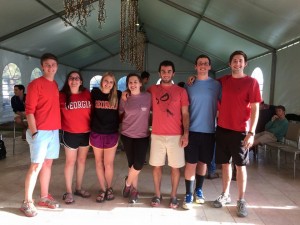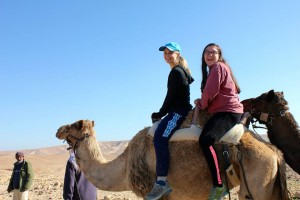I hear their voices.
Voices of the people who want the world to stay as it is—the people who have too much to lose
if things change.
They say to stay quiet.
They say to keep my mouth shut.
They say to silence my voice.
They say to push down my emotions so I can stay level-headed.
They say not to rock the boat.
They say not to say anything that will cause disagreement.
They want me to conform.
They want us to conform.
I hear other voices.
Voices of the people who are losing their lives.
They say they are terrified to make one wrong movement.
They say that “freedom” doesn’t feel so free.
They say they are trapped in a system that isn’t fair.
They say they just want equality.
They say they want the same opportunities I have.
They say people are scared of them.
They say they are misunderstood.
They say they are tired of people walking on the other side of the street at night because of their
skin color.
They say they are tired of not getting a fair trial in court.
They say they are tired of dying.
They say they are tired of crying themselves to sleep at night when they mourn for their brothers
and sisters.
They say they are tired of being punished for doing the only thing they know how to do in order
to put food on the table for their family.
They say they can’t help it.
So they say they want me to help.
They want us to help.
I hear another voice.
It’s the voice coming from deep within my soul.
He says to love people.
He says to care about other people before I care about myself.
He says to encourage my black brothers and sisters.
He says I should make sure they know I love them.
He says I should do what I can to help.
He says I should mourn with them.
He says I should comfort them.
He says I should listen to them.
He says I should pray for them.
He says I should pray with them.
He says I have a lot to learn from them.
He says to see the world in through their eyes before making any judgments.
He says to make friends with people who have different situations than I do.
He says that I should do more than rock the boat—he says I should sink it.
He wants me to move. He wants us to move.
There’s one voice I haven’t heard, though.
It’s my voice.
I haven’t said anything at all.
But that changes today.

In the past, I didn’t understand all the hype around the Black Lives Matter movement. So, I chose to stay silent on it. I would think things like: Yes, I want everyone to be equal, but we have equality already. They need to realize that none of these things would be happening if they would just obey the laws (the list could go on and on).
As I became friends with some incredible people who are affected daily by fear, hatred, and stereotyping, however, my eyes were opened to the inequality we are still battling today.
These people led me to understand that things are not equal just because we supposedly play by the same rules.
They led me to believe that something has to be changed so people don’t have to break the law just to get by.
One time, I was driving through Atlanta with my friend a few weeks back. We were on the way to our church to play basketball. My friend has a heart of gold, but he is a teenaged, black male with an athletic build. The clothes he wears represent the culture he grew up in. Honestly, people look at his neighborhood—which he didn’t get to choose to live in—he doesn’t get a chance to show his heart before he is judged.
Anyways, he told me that he had recently spent a night in jail because he was having an altercation with his brother outside of their house. I listened to him tell me about this altercation and I couldn’t help but notice that it didn’t sound any different than fights I had with my brother when I was in high school. Nevertheless, somebody driving by saw the brotherly wrestling match taking place and called the police. When the police arrived, my friend and his brother were done fighting.
Now, I don’t want to say that the police had ill-intentions or are intentionally racist.
I don’t think there any many officers who do have ill-intentions. This is not an attack on them. However, there is a deeper problem in our society: We have a scale that measures how violent, harmful, or dangerous someone is…and we use skin color as the main variable. So, they assumed that my friend was dangerous. When they approached him to talk about the altercation, he tried to explain the story and say that it was resolved. But, the police took his explanation as some sort of resistance. They then violently threw him on the ground as they arrested him. He was arrested on the charges of domestic violence and resisting arrest.
Then, he had to get bail bonds to be able to get out of jail. Basically, he was thrown, arrested, charged, and forced into debt for something I would have got a slap on the wrist for. That dude looked at me that day with tears in his eyes and said, “Man, I swear it felt like they were trying to bring back slavery or something.” At that moment I realized that I couldn’t possibly understand what that was like. If I had a tussle with my brother like that, my parents would have handled the situation after things died down. I speak up now. Something has to change.
I work with a black girl who has become one of the most influential voices in my life lately. In a few short months, she has taught me more about loving people and praying for them than I could have ever known. As we were sitting in the office last week, she read an article about the KKK being allowed to adopt a highway in south Georgia. The article goes on to talk about the organization’s plans to make a comeback after 150 years from the time it was founded.
When I read that, I get angry.
I want to know what in the world those people are thinking; and then I put it down and don’t think about it anymore. That is not the case for people who are directly affected by that, though. I will never be able to forget the moment when my heart fell to the floor as I watched my friend cry.
I will never be able to forget the loss of words I had as I attempted to pray over her. I will never be able to forget the realization I had in that moment—the realization that I would never be able to understand the pain and the heartache that the inequality we still have today brings into the lives of my black brothers and sisters.
So I speak up now: something has to change.
I could provide story after story and example after example. I could tell you about the kids I work with who are absolutely incredible, but will never have the same experience and opportunities as white kids unless something changes. I could tell you about the high school students I work with who are affected every single day by all of the stuff going on.
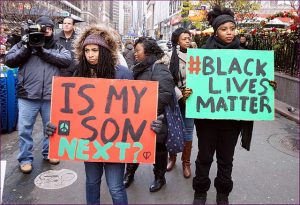
They feel like they are trying to be seen, but are invisible because people who don’t understand are too busy looking at themselves.
They feel like they are trying to be heard, but their voices are being dismissed because of the very thing they are speaking up against. People tell them that their opinions are irrelevant. It’s like a soccer player who knows nothing about baseball trying to tell a baseball player that his opinions about the unfair umpire are irrelevant or stupid—it just doesn’t make sense.
So I speak up now: something has to change.
If you have ever played monopoly, you know that it can be fun for some people. For others, monopoly
can be one of the longest and most frustrating games ever. One time, I decided to join my
friends in a monopoly game they had already started. Places were already bought and occupied,
and there was only a little bit of money the bank could afford to dish out to me. So, I started playing
without much of a chance. I could basically land on someone else’s spot and have to pay or
the “Go to Jail” spot. Now, nobody would say that I ever had a fair shot.
I think our environment is a lot like that.
White people, like myself, have been playing the game since the late 1700’s.
We played the game for over 150 years, then, people wanted to join. So, after
we tried to be the playground bully who won’t let anyone else into his clique, we reluctantly
allowed black people to play. We told them that they have the same rules as us and are allowed
to do the same things we are allowed to do and we called that equality. Unfortunately, the only
places they had left to land on were places where they had to pay, take the back seat, or go to
jail. That doesn’t sound very equal to me.
If you want another illustration as you wrestle through what it may feel like for someone else,
Here is a video that illustrates this point in a slightly different way. It is incredible.
So What Can I Do?
Listen. Learn. Love. No matter what you do in life, if you can do these three things before anything
else, you are much more likely to understand, make rational judgement, and make a difference
with what you say.
Speak up. If you are a silent supporter, know that we need your voice. We need the voice of people
who are not personally affected by these things. For example, I could physically go on living
comfortably no matter what happens with this issue in our world, but I speak up because I am
willing to give up my privilege if that is what it takes. I realize that there are people who wouldn’t
claim to be followers of Jesus reading this article, but I do want to point out that Jesus told us that
life is found when we consider others more highly than ourselves. So let’s do that! Instead of
fighting for what we personally want, let’s be willing to fight for the things others need—even if it
means we have something to lose.
Be willing to lose something for the sake of other people having the opportunity to be valued as they should be.
Speak up. The world needs to hear that you
care for justice and mercy. The people who are being hurt need to hear that you are with them
and see that you are willing to stand with them no matter what other people think.
Speak Up!
I would like to say that I would have spoken up in the 1800’s when slavery was being abolished.
I would like to say that 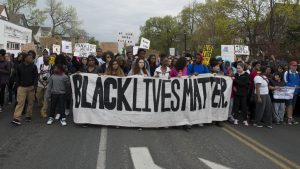 I would have stood with my black brothers and sisters in the 1950’s during
I would have stood with my black brothers and sisters in the 1950’s during
the Civil Rights Movement.
I fail to realize that it wasn’t the popular thing to do as a white person.
People who had something to lose would have called me crazy for doing those things in that
time.
Nothing has changed.
History is being written as we speak, and I refuse to look back in 50
years and tell my children that I didn’t do something to help move the world forward.
I refuse to have to tell my children that I was silent while my friends were living in fear, grief, and pain. So I
speak up—and you should too.
Tell people who they are.
This one may seem a little weird, but people tend to become who they
hear they are. If someone hears constantly that they were born to lead, they will be leaders. If
someone is told they were a mistake, they will most likely live like they are a mistake.
Peoples’ identity often get bound up in the things others say to them or about them. Let’s stop telling people
that they are uneducated and ignorant so we can start telling people that they are smart,
loved, wonderful, beautiful, and Children of the Creator of the Universe.
Bring Peace.
All the people who have helped move our world forward have done something that
disrupts the status quo. All the people we celebrate as heroes today, were revolutionaries yesterday.
Think about it.
MLK was shot.
Lincoln was assassinated.
Jesus Christ was hung on
a roman death trap.
Each of these people were considered revolutionaries back then, but are heroes
today. So, let’s rebel. Let’s rebel peacefully and joyfully. Let’s speak up for justice, mercy,
equality, and love. Then, lets commit to loving the haters so much that they can hardly disagree
with us any longer.
Let’s commit to going out of our way to help the haters so they can’t bring any
real evidence against our case for justice, mercy, equality, and love.
So let’s rebel. Let’s speak up.
Let’s stand up. But, let’s remember why we are fighting and rebelling in the first place:
Love for
others.
Make one difference. Just bring joy into someone’s life by investing in them and helping them out
of a possible situation. It is not our job to change it all, but it is our job to change what we can
and inspire others to do the same thing.
I hear their voices.
They say not to speak up.
It’s not that they are bad people.
They just don’t want life to change for them.
Change is scary.
So, they don’t try to understand.
They say to keep quiet.
I hear their voices.
They are longing for justice, equality, peace, and love.
They can’t help their situation.
They say they don’t have it like I have it.
They say that nobody understands.
They say to speak up
I hear the voice in my soul.
He is hurting for others.
He is causing me to weep when I watch a video of a real, human life being taken.
He is telling me to be willing to give up some of my privileges so that other people can have
them.
He is telling me that the only real love in the world happens when we are willing to lay down
our lives for our brothers and sisters.
And now…now I can finally hear my own voice.
I am shouting to the world that I am not going to be silent any more.
I am shouting to my black brothers and sisters that I am with them!
I am shouting that they are worth dying for.
I am shouting that I love them—that I am willing to lay down my pride, the opinions of my
friends and family, and even my life if it will make their lives better.
I am Silent No More.
My Recommended Resource:




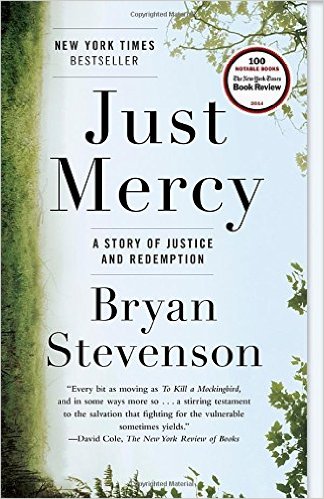
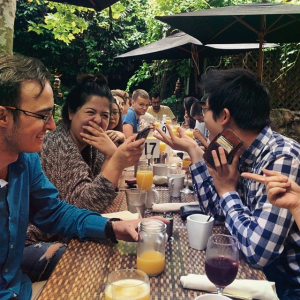
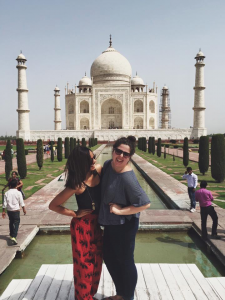
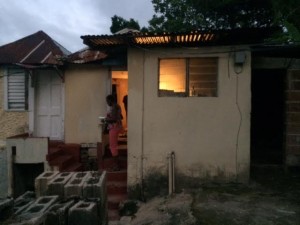 The last time I visited Jamaica was this past Christmas.
The last time I visited Jamaica was this past Christmas.

 Because I moved before third grade ended, my homeroom teacher would pick me up from home in the mornings and take me with her to class so that I didn’t have to switch schools so close to the year ending. It was in this house that I got my first real room. In the apartments, my room was the sunroom so I didn’t have a door.
Because I moved before third grade ended, my homeroom teacher would pick me up from home in the mornings and take me with her to class so that I didn’t have to switch schools so close to the year ending. It was in this house that I got my first real room. In the apartments, my room was the sunroom so I didn’t have a door. Just in time for high school, we moved again to where we live now, near College Park in an even bigger house. In this house is where I experienced most of my growing pains as the coming-of-age phase of my life transpired.
Just in time for high school, we moved again to where we live now, near College Park in an even bigger house. In this house is where I experienced most of my growing pains as the coming-of-age phase of my life transpired.